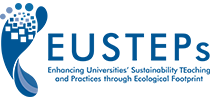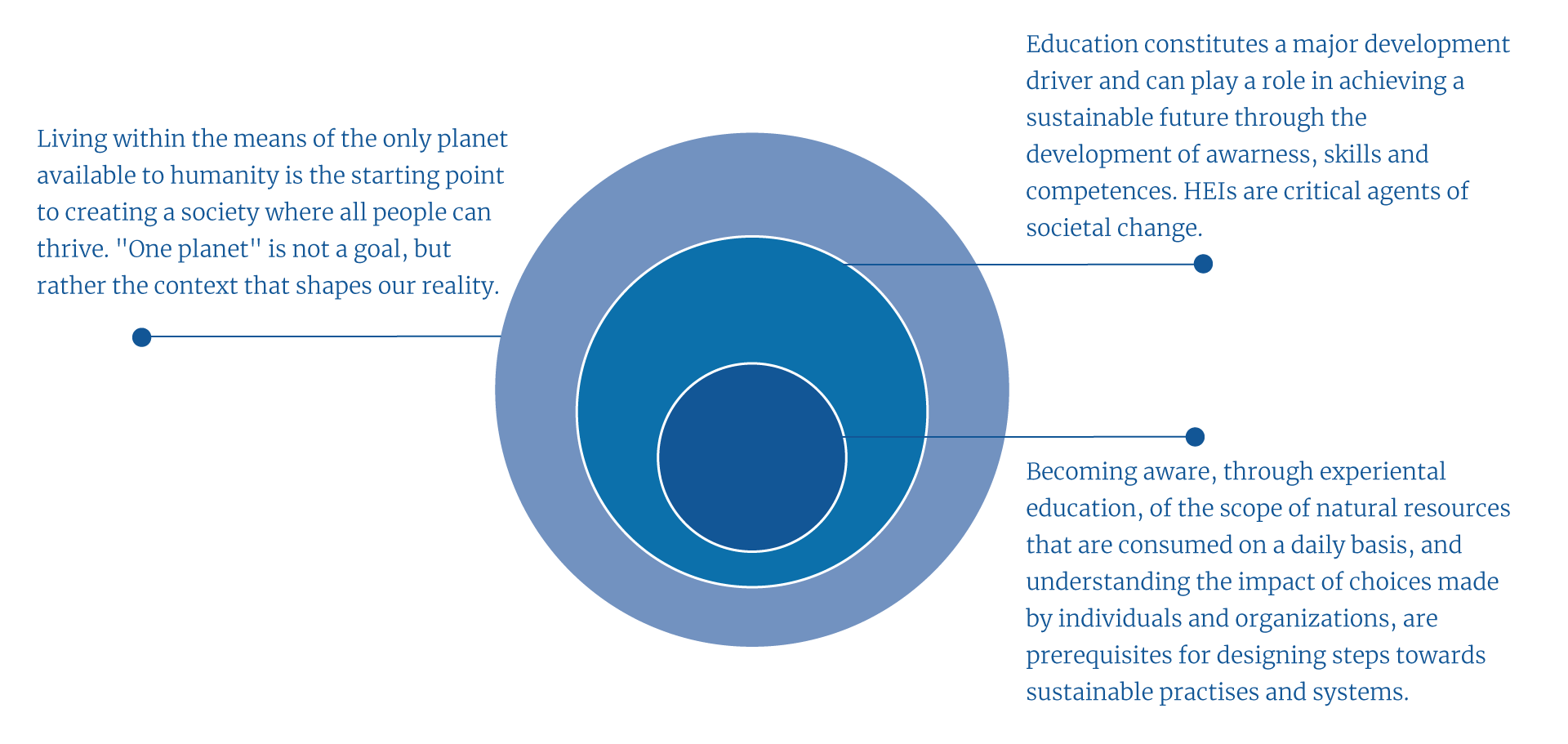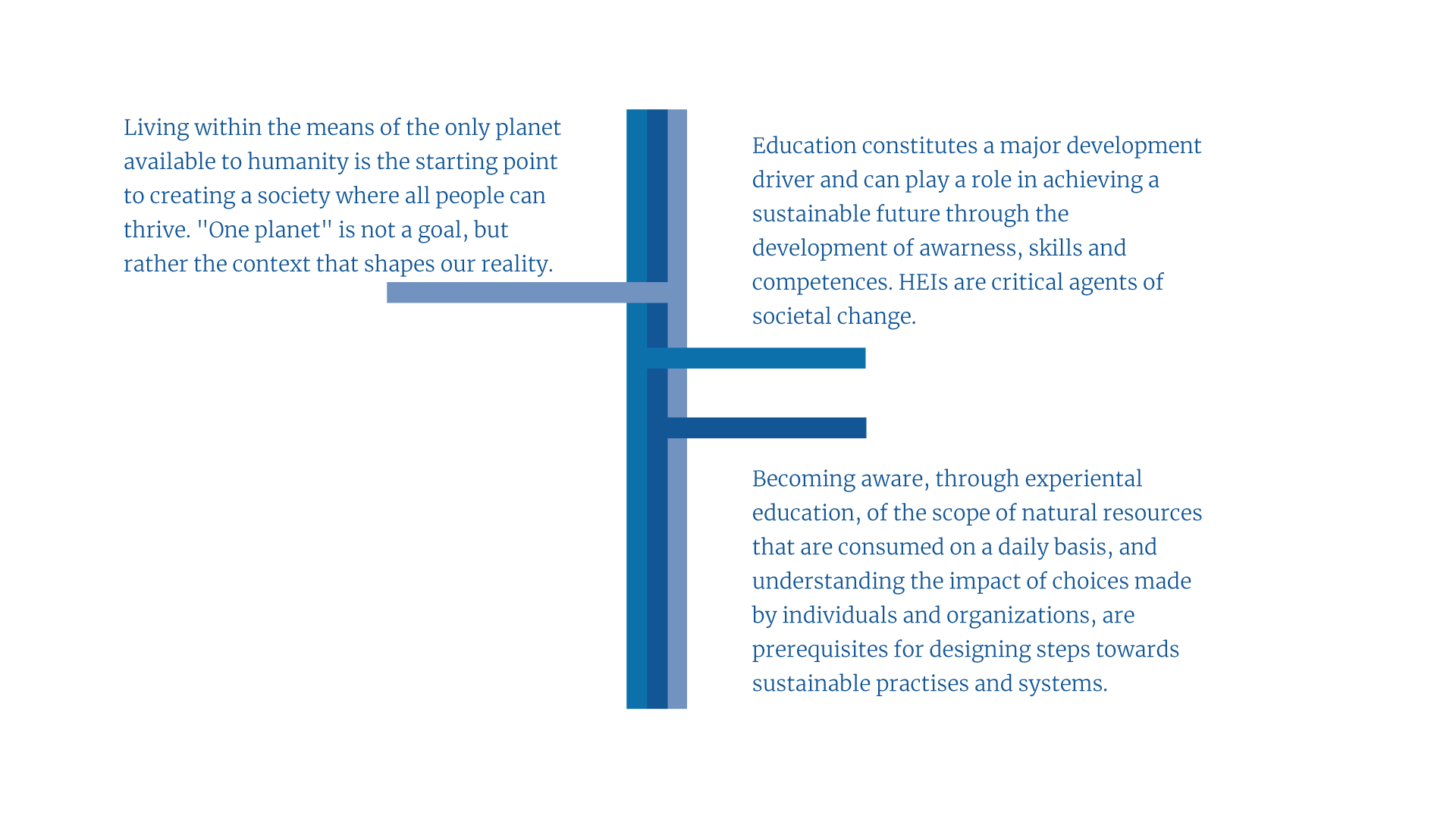What
EUSTEPs aims to educate European university students and the wider academic community about the complexity of sustainability and its interdisciplinary nature in an engaging and captivating manner.
In addition, its goal is to support the assessment and reduction of the environmental impact of EU Higher Education Institutions (HEIs) through an experiential approach based on an innovative application of the Ecological Footprint.
EUSTEPs is a three-year project funded by the ERASMUS+ program.
What
EUSTEPs aims to educate European university students and the wider academic community about the complexity of sustainability and its interdisciplinary nature in an engaging and captivating manner.
In addition, its goal is to support the assessment and reduction of the environmental impact of EU Higher Education Institutions (HEIs) through an experiential approach based on an innovative application of the Ecological Footprint.
EUSTEPs is a three-year project funded by the ERASMUS+ program.
Why
An increasing number of recent studies point out the role that humans have played, and will play, in altering the dynamics of the planet if unsustainable socio-economic trends are not inverted. Hence the urgent need for education to ease the knowledge-awareness-action journey.
Why
An increasing number of recent studies point out the role that humans have played, and will play, in altering the dynamics of the planet if unsustainable socio-economic trends are not inverted. Hence the urgent need for education to ease the knowledge-awareness-action journey.
The critical role of education for sustainable development
Since the 1972 UN Stockholm Conference, education has been recognized as key in fostering environmental protection and has gained a central role in easing the transition to a sustainable world.
Agenda 21 has called for reorienting education towards sustainable development, while UNESCO launched the Decade of Education for Sustainable Development 2005-2014 and the Global Action Programme on Education for Sustainable Development.
With the adoption of the UN Agenda 2030 in 2015, education has been linked to 16 of the 17 Sustainable Development Goals (SDGs) and sustainable, equitable education has become a core objective of SDG target 4.7 about “ensur(ing) that all learners acquire the knowledge and skills needed to promote sustainable development.”
The critical role of education for sustainable development
Since the 1972 UN Stockholm Conference, education has been recognized as key in fostering environmental protection and has gained a central role in easing the transition to a sustainable world.
Agenda 21 has called for reorienting education towards sustainable development, while UNESCO launched the Decade of Education for Sustainable Development 2005-2014 and the Global Action Programme on Education for Sustainable Development.
With the adoption of the UN Agenda 2030 in 2015, education has been linked to 16 of the 17 Sustainable Development Goals (SDGs) and sustainable, equitable education has become a core objective of SDG target 4.7 about “ensur(ing) that all learners acquire the knowledge and skills needed to promote sustainable development.
The emergence of the Ecological Footprint as a tool for sustainability
Based on UN data, Ecological Footprint accounting measures humanity’s demand on nature on the one hand and the capacity of the planet’s ecosystems to renew ecological resources on the other hand. Conceived in the early 1990s, Ecological Footprint has since become a very popular tool being used in a wide range of contexts (from education to policy making) and at multiple geographical levels. Its most popular application is the Footprint Calculator, which individuals can use to measure their personal Ecological Footprint (www.footprintcalculator.org.)
EUSTEPs sets out to expand on the use the European Commission (EC) is already making of the Ecological Footprint within the EU 2020 Biodiversity Strategy, and to bring this tool within the EU higher education system through implementation at university level.
The emergence of the Ecological Footprint as a tool for sustainability
Based on UN data, Ecological Footprint accounting measures humanity’s demand on nature on the one hand and the capacity of the planet’s ecosystems to renew ecological resources on the other hand. Conceived in the early 1990s, Ecological Footprint has since become a very popular tool being used in a wide range of contexts (from education to policy making) and at multiple geographical levels. Its most popular application is the Footprint Calculator, which individuals can use to measure their personal Ecological Footprint (www.footprintcalculator.org.)
EUSTEPs sets out to expand on the use the European Commission (EC) is already making of the Ecological Footprint within the EU 2020 Biodiversity Strategy, and to bring this tool within the EU higher education system through implementation at university level.
How
EUSTEPs ingeniously intertwines conceptual knowledge of environmental, economic and social principles of sustainability with popular digital tools, as well as innovative teaching and learning practices.
The key outputs of the EUSTEPs project are:
E-learning Platform & University Footprint Calculator
How
EUSTEPs ingeniously intertwines conceptual knowledge of environmental, economic and social principles of sustainability with popular digital tools, as well as innovative teaching and learning practices.
The key outputs of the EUSTEPs project are:
E-learning Platform & University Footprint Calculator
E-learning Platform
A set of teaching modules and a MOOC customized for the four project target groups (students, teaching staff, administrative staff, management bodies), which are interactive, innovative and applicable at European level and beyond, thus contributing to SDG 4.
E-learning Platform
A set of teaching modules and a MOOC customized for the four project target groups (students, teaching staff, administrative staff, management bodies), which are interactive, innovative and applicable at European level and beyond, thus contributing to SDG 4.
Co-developed by academics, PhD. students, administrative staff, and NGO representatives through a participatory process. This tool, available by 2021, will allow users to identify a university’s unsustainability drivers and initiate the necessary process to lower the impact of HEIs (and of working spaces), thus contributing to SDGs 11, 12, and 13.
Co-developed by academics, PhD. students, administrative staff, and NGO representatives through a participatory process. This tool, available by 2021, will allow users to identify a university’s unsustainability drivers and initiate the necessary process to lower the impact of HEIs (and of working spaces), thus contributing to SDGs 11, 12, and 13.
Goal
EUSTEPs aims to become the reference for HEIs teaching and practicing sustainability. The project’s ambition is to set the foundation for an innovative experiential approach that can be disseminated and scaled-up at the European level – with a view to opening up the platform in due time to HEIs around the world.
Ultimately, the project will contribute to creating a new generation of sustainability-conscious citizens and professionals, who will be trained to assess and analyze impact drivers with the use of dedicated digital tools, thus introducing a new and necessary professional expertise in society.
Goal
EUSTEPs aims to become the reference for HEIs teaching and practicing sustainability. The project’s ambition is to set the foundation for an innovative experiential approach that can be disseminated and scaled-up at the European level – with a view to opening up the platform in due time to HEIs around the world.
Ultimately, the project will contribute to creating a new generation of sustainability-conscious citizens and professionals, who will be trained to assess and analyze impact drivers with the use of dedicated digital tools, thus introducing a new and necessary professional expertise in society.




